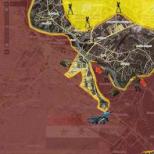Obninsk State Technical University of Nuclear Energy. JSC Atomenergoprom

According to Rosatom State Corporation estimates, the annual need for new specialists in the industry is 3-3.5 thousand people. Thus, training competent personnel for the nuclear energy industry is one of the most pressing problems in the development of the Russian nuclear energy sector.
Educational and methodological support
The quality of nuclear engineering education today is controlled by three educational and methodological associations (EMU).
The UMO, based at the Moscow Engineering Physics Institute, within the framework of the “Nuclear Physics and Technology” direction, coordinates education, training and methodological work in 19 universities and six military schools in the following specialties:
- "Nuclear reactors and power plants",
- "Security and non-proliferation nuclear materials»,
- “Electronics and automation of physical installations”,
- “Radiation safety of humans and the environment”,
- “Physics of charged particle beams and acceleration technologies”,
- "Physics of the atomic nucleus and elementary particles",
- “Physics of Condensed Matter of Materials”,
- "Physics of kinetic phenomena."
UMO on the basis of the Russian Chemical-Technological University named after. DI. Mendeleev conducts similar work with seven universities that graduate specialists in the field of " Chemical technology" Specialties: “Modern chemical technologies for the energy industry” and “Chemical technologies of rare elements and rare earth materials.”
The UMO, based at the Moscow Energy Institute, controls seven universities in the field of “Nuclear and Hydrogen Energy”. Specialties:
- “Nuclear power plants and nuclear installations”,
- "Technical Physics thermonuclear reactors and plasma installations",
- “Water and fuel technologies at thermal and nuclear power plants.”
Training of specialists
Currently, 22 Russian universities operate 32 programs in nuclear specialties, providing upon completion the qualification of an engineer (specialist), and more than 25 master's programs.
The main state universities training nuclear engineers are:
- National Research Nuclear University "MEPhI" - the base university of the State Corporation "Rosatom";
- Moscow State Technical University named after. N.E. Bauman (MSTU);
- Ivanovo State Energy University (ISEU);
- Moscow Energy Institute (Technical University, MPEI);
- Russian Chemical-Technological University named after. DI. Mendeleev (RHTU);
- Obninsk Institute nuclear energy(IATE);
- St. Petersburg State Polytechnic University (SPbSPU);
- Nizhny Novgorod State Technical University (NSTU);
- Tomsk Polytechnic University (TPU);
- Ural State Technical University (USTU).
Most universities have experimental facilities, where students can complete their laboratory work and research assignments and gain practical experience. For example, NRNU MEPhI and Tomsk Polytechnic University have working research reactor installations, NSTU, Moscow Power Engineering Institute, St. Petersburg State University have unique experimental installations for thermal-hydraulic studies of various coolants, and radiochemical laboratories equipped with sophisticated measuring equipment are located at Russian Chemical Technology University, USTU and Tomsk Polytechnic University. On the basis of National Research Nuclear University "MEPhI" a number of research centers– nuclear, particle acceleration, laser, materials science, non-proliferation, nanotechnology and others.
Universities provide education and training in accordance with curricula and standards that reflect the specific requirements for specialists in a given field. These standards include:
- Full-time higher education only;
- special attention paid to fundamental knowledge of physics and mathematics, combined with engineering skills;
- a significant proportion of practical laboratory classes;
- student research work starting from the seventh semester;
- Duration of training is five to six years, while pre-graduation practice and the preparation of the thesis is given for six months;
- strict requirements for the professional qualities of students, which necessarily include a safety culture and knowledge of nuclear non-proliferation issues.

Consolidation of educational infrastructure
A competent nuclear specialist has deep knowledge of natural sciences, various engineering skills, the ability and willingness to master new nuclear technologies and equipment, masters the methodology for performing numerical computer and full-scale experiments, assessing the reliability and reliability of experimental data. He must be ready to make decisions and cope with optimization problems with a large number of parameters and criteria. The competence of such a specialist requires the ability to take into account technological, ergonomic and economic limitations, possession of relevant skills in information technology, communication skills required for teamwork, ability to communicate with specialists from related nuclear technical fields, ability to work within international projects, good level of English.
To achieve these goals, it was decided to consolidate the knowledge and infrastructure of Russian nuclear educational institutions. The first step was taken in 2007, when the Russian Nuclear Innovation Consortium (RNIC) was created, which includes 21 universities, three institutes for advanced training and 12 research centers.
In December 2009, the National Research Nuclear University was created - a networked regional academic and research complex based on MEPhI (NRNU MEPhI).
Similar one educational space is created in accordance with current principles and trends in nuclear engineering education around the world.
Cooperation with enterprises
IN last years Russian universities got the opportunity to more effectively use the research facilities of leading Russian nuclear institutes and industrial enterprises for practical training, research and theses students.
For example, at the State Research Center of the Russian Federation-IPPE (Obninsk), critical stands BFS-1 and BFS-2 are used both in research purposes, and as a valuable educational resource when training students, teachers and specialists. Large volume today educational material and installations, including laboratories, became available to domestic and foreign students. The BFS-1 and BFS-2 stands also contain archival data on various demonstration tests and experiments carried out on them. wide range tasks, including simulating fast reactor conditions various types, optimization of the neutronic regime of their cycles, confirmation nuclear safety. Combined with an ever-expanding program of lecture courses and exemplary experiments, these stands provide students with unique opportunity access to real full-scale experimental work and its results. In fact, everything that is currently located at this site is connected, in one way or another, with future fast reactors.
JSC "SSC RIAR" in Dimitrovgrad also offers its experimental stands and personnel for training.
Students of relevant specialties are sent to undergo pre-diploma internship and write diploma theses at nuclear power plants Russian Federation, thanks to which the efforts of the teaching staff and practitioners are combined to prepare future professionals. NRNU "MEPhI" together with leading organizations in the nuclear industry have organized 26 scientific and educational centers that combine the efforts of organizations and the university both to conduct scientific research, and for teaching undergraduate and graduate students. Many of them won the competition of research and educational centers within the framework of the federal target program“Scientific and scientific-pedagogical personnel of innovative Russia” for 2009-2013.
International partnership
Since 1997, the world's first master's program for training specialists in the field of safeguards and security of nuclear materials has been operating as part of a joint project of the US Department of Energy, leading American nuclear laboratories and MEPhI.
In recent years, a group of teachers from the USA and the Russian Federation has also been developing new master's programs that will have to work on solving new world problems that are currently emerging. The Joint Russian-American International Nuclear Safety Program, implemented with the support of the US Department of Energy and Rosenergoatom, provides nuclear faculty from Texas A&M, Merlinda and Oregon Universities (USA) and National Research Nuclear University MEPhI the opportunity to work together to prepare human resources for the nuclear industry .
Professors at these universities have been creating new master's programs since 2004. The new curricula they have developed for students around the world involve the implementation of experimental and theoretical research, a course of lectures on the physics of fast reactors with a total duration of 72 hours, conducted practical work. As part of the international nuclear safety program, students can undertake internships at installations in France, Switzerland and the Russian Federation.
A number of universities offer innovative projects within the framework of nuclear knowledge management and GNEP initiatives, for example, foreign internship at facilities in the Russian Federation for foreign students, nuclear engineering courses in English for students from third countries, short-term theoretical lecture courses conducted by leading nuclear specialists and experts. NRNU "MEPhI" actively cooperates with the IAEA on the management and preservation of nuclear knowledge and the development of approximate educational programs in the field of “Nuclear Security and Safety” and “Nuclear Technologies and Engineering”. The IAEA mission on nuclear knowledge management, which visited NRNU MEPhI in January this year, confirmed the leading role of the university in Russian system nuclear education. It was noted that NRNU MEPhI has every opportunity to become an international regional center for nuclear education, training, retraining and advanced training of personnel in the field of peaceful uses of nuclear energy for countries that have embarked on the path of nuclear energy development. NRNU "MEPhI" is already involved in the work of the IAEA on technical assistance programs for Belarus and Armenia for the development of the necessary human resources.
The main goal of all these events is to motivate a new generation of students to work in the industry, prepare them to solve various technological problems, and also promote compliance with non-proliferation and international security.
Based on the order of the Government of the Russian Federation dated April 8, 2009 No. 480-z and order Federal agency on education dated April 29, 2009 No. 461 state educational institution of higher education vocational education"Obninsk State Technical University of Nuclear Energy" was reorganized by joining the Federal State Budgetary Educational Institution of Higher Professional Education "National Research Nuclear University "MEPhI" with the formation on its basis of the Obninsk Institute of Nuclear Energy - a branch of the Federal State Budgetary educational institution higher professional education “National Research Nuclear University “MEPhI”.
By order of the Ministry of Education and Science of the Russian Federation dated November 28, 2011 No. 2757, the institute was renamed the Obninsk Institute of Nuclear Energy - a branch of the federal state autonomous educational institution of higher professional education "National Research Nuclear University "MEPhI".
Structure of the IATE NRNU MEPhI:
- Institute nuclear physics and technologies;
- Engineering Physics Institute of Biomedicine (Department of Biotechnology);
- Institute of Intelligent Cybernetic Systems;
- Institute of Laser and Plasma Technologies;
- Department of Social and Economic Sciences;
- Technical school IATE NRNU MEPhI.
Training is conducted according to federal state standards: bachelor's, specialist's, master's and postgraduate degrees.
Training classes at the IATE NRNU MEPhI are taught by 352 teachers, of whom 59 are doctors of science, 172 candidates of science, including 12 full members of specialized Russian and foreign academies. As a higher educational institution in the science city of IATE, NRNU MEPhI has the opportunity to use the unique experimental base of one and a half dozen research institutes with the most modern equipment, and to involve leading research institute specialists in the educational process.
IATE NRNU MEPhI has educational and laboratory buildings with an area of 31 thousand m2, sufficient for conducting educational process and scientific research. The laboratories are equipped with modern instruments, installations, working models, computer facilities, and there is a network of display classes with Internet access. For nonresident students, IATE NRNU MEPhI provides 5 comfortable dormitories with total area 30 thousand m2, located within the city and on campus. For sports and physical culture The university has two modern equipped sports complexes and sports grounds with a total area of 4 thousand m2.
| Obninsk Institute of Nuclear Energy - branch of the Federal State Autonomous Educational Institution of Higher Professional Education "National Research Nuclear University "MEPhI" (IATE) |
|
|---|---|
| Former name | Obninsk State Technical University of Nuclear Energy (IATE) |
| Head organization | National Research Nuclear University "MEPhI" .. |
| Year of foundation | 1953 |
| Students | over 2.7 thousand people in full-time education, about 250 people in the evening faculty and about 1000 people studying correspondence forms e. |
| The doctors | 94 |
| Teachers | 473 |
| Location | Russia Russia, Obninsk, Kaluga region |
| Legal address | 249040, Obninsk, Kaluga region, Studgorodok, 1 |
| Website | http://www.iate.obninsk.ru/ |
(IATE) is a higher educational institution in Obninsk, founded in 1985 on the basis of the Obninsk branch. Until 2002 it was called Obninsk Institute of Atomic Energy. In 2002 it received the status of a state technical university and was renamed Obninsk State Technical University of Nuclear Energy. On April 29, 2009, by order of the Federal Education Agency No. 491, the Obninsk State Technical University of Nuclear Energy was reorganized by joining the National Research Nuclear University MEPhI with the name Obninsk Institute of Nuclear Energy - a branch of the federal state budgetary educational institution of higher professional education "National Research Nuclear University "MEPhI".
IATE is the only higher educational institution in Russia that trains specialists in the field high technology for organizations in nuclear energy, science and technology.
Encyclopedic YouTube
-
1 / 5
IATE organizes and conducts international conferences on safety and personnel training for nuclear energy, materials science, etc.
Story
Obninsk branch of the Moscow Engineering Physics Institute (1953-1985)
Laboratory “B” of the Ministry of Internal Affairs of the USSR - enterprise post office box 276 (hereinafter) of the Ministry of Medium Machine Building of the USSR needed specialists in nuclear energy. In 1950, the director of the IPPE, D. I. Blokhintsev, signed an order to establish at the enterprise a post office box 276 correspondence departments of the Moscow Mechanical Institute (later transformed into a branch of MEPhI) and Moscow State University. The organization of these departments was entrusted to the head of the laboratory, post office box 276, V. N. Glazanov.
The new educational institution did not have full-time teachers and classrooms, but academic work was carried out satisfactorily. In 1952, the educational institution was transformed by the Ministry of Higher and Secondary Special Education of the USSR (order of October 24, 1952) into the evening department No. 5 of MEPhI. This order was issued almost two years later, in August 1954, without staffing table and financing.
The problem of missing classrooms was solved by using part of the school building named after Shatsky and the basements of the dormitories and premises of the IPPE personnel department. Laboratory works were carried out in the corresponding IPPE laboratories with the participation of employees of these laboratories. Formally, the educational institution was a branch of MEPhI, but in fact it was a branch of the IPPE.
In order for the educational institution to receive its own building, V.N. Glazanov, being the IPPE Deputy Director for Science, committed a forgery by building a new building with an area of 400 square meters. m according to documents for the IPPE division and transferring it in 1959 to the MEPhI branch.
By the beginning of the 1960s, a team of teachers, educational and support staff was formed, and educational and research laboratories, workshops, and offices were created, fully equipped with modern equipment and instruments. The laboratory was headed by the first employees: L. M. Miroshnichenko, T. E. Prokurat, M. V. Borisov, G. M. Nazarova, Yu. A. Fedorov.
In 1962, 50 people began studying full-time in the first year. In 1963, the institute of curators working on a voluntary basis was introduced. Also, an educational commission headed by students began to work on a voluntary basis, whose responsibility was to monitor the progress of students.
The organization of training included educational and research work for two days a week, starting from the 4th year, on the basis of IPPE, then pre-diploma practice and, finally, a diploma as the final stage of the two previous types of training. The diplomas as a result were mostly high level.
Over the twenty years of the existence of the MEPhI branch, the number of full-time teachers increased from three in 1954 to one hundred and four in 1974. Graduates of the Obninsk branch of MEPhI were already highly regarded in the early 1960s, and the teaching staff arose the idea of creating an independent institute on the basis of the branch for training physicists in the fields of biology, radiology, geology, and meteorology. The curricula developed by the institute were agreed upon with the relevant ministries. In 1963, an order was issued by the USSR Ministry of Higher and Secondary Education to organize an independent institute on the basis of the branch with admission of 275 people, with funding from the USSR Ministry of Medium Engineering for the construction of an educational building and a dormitory for students. A project for an educational building was developed, the construction of which was completed in 1964 to the 1st floor. However, in the same year, after the death of sixty-six-year-old V.N. Glazanov, the general contractor IPPE transferred the building to the Central Institute for Advanced Studies (CIPK). The very existence of the branch was called into question. In 1966, a ministerial order was issued higher education USSR V.P. Elyutin and the USSR Minister of Medium Engineering E.P. Slavsky on the closure of the full-time department due to the inexpediency of parallelism in the training of physics engineers in the Obninsk branch and MEPhI itself.
The team of teachers managed to convince the leadership of the Ministry of Medium Engineering not to disperse the unique educational institution that had been formed. For three years (1968, 1969, 1970) the institute existed semi-legally. There was a day department, which was liquidated according to the order. In 1969-1970, the teaching staff, with the support of everyone scientific institutes Obninsk sought to open a branch. In 1970, an order was issued to open a branch of MEPhI in Obninsk to train specialists in automated control systems (ACS) and computer technology.
In 1970, the branch was headed by G. A. Sereda, under whom an educational building was built, the departments were partially equipped with modern equipment and instruments, the new institute received well-trained teaching and educational support staff. In 1985, on the basis of the MEPhI branch, a new Institute of Atomic Energy (IATE) was created, which headed
Attention future applicants!
It's time for open days at universities! If you have decided to connect your future with the nuclear industry, but have not decided which one educational institution You will be gnawing on the granite of atomic science, we hope this list will help you.
Here are the main specialized universities, contacts and dates for open days.
By the way, you can also learn about atomic formation
1. Moscow Engineering Physics Institute (state university)- February 8, 2009, 10:00- Faculty of Physics and Technology (tel. 324-84-41).
- February 15, 2009, 10:00- Faculty of Automation and Electronics (tel. 324-84-42).
- March 1, 2009, 10:00- Faculty of Experimental and theoretical physics(tel. 324-84-40).
- March 15, 2009, 10:00- Institutes of the Faculty of Humanities:
Institute international relations, tel. 323-95-83;
Economic-analytical institute, tel. 324-84-22;
Financial Institute, tel. 323-92-20, 323-92-21;
Institute of Innovation Management, tel. 323-90-88, 323-91-33;
Institute of Financial and economic security, tel. 323-95-27. - March 22, 2009, 10:00- Faculty of Cybernetics (tel. 324-84-46).
- March 29, 2009, 10:00- Faculty information security(tel. 323-94-61).
- April 11, 2009, 10:00- Faculty of part-time (evening) studies (tel. 324-71-04).
- April 18, 2009, 2:00 pm- Faculty of Humanities (repeatedly).
3. Ural State Technical University
4. Tomsk Polytechnic University
5. St. Petersburg State Polytechnic University
University-wide Open Day - January 18, 2009 year in the Assembly Hall of the main building. Starts at 11:00.
Faculty Open Days:
- January 31, 2009, 4:00 pm- Faculty of Civil Engineering, Faculty of Physics and Mechanics.
- February 7, 2009, 4:00 pm- Faculty of Mechanical Engineering, Faculty of Technical Cybernetics, Faculty of Medical Physics and Bioengineering, Institute of International Educational Programs.
- February 14, 2009, 16:00- Electromechanical Faculty, Faculty of Technology and Materials Research, Faculty of Economics and Management, Faculty of Physics and Technology, International graduate School Management, Faculty at the Central Research Institute of Robotics and Technical Cybernetics, Faculty of Law.
- February 21, 2009, 16.00- Faculty of Radiophysics, Faculty of Humanities, Faculty of Integrated Security, Faculty of Management and Information Technologies.
- February 28, 2009, 4:00 pm- Faculty of Power Engineering, Faculty of Innovation, Faculty of Foreign Languages.





